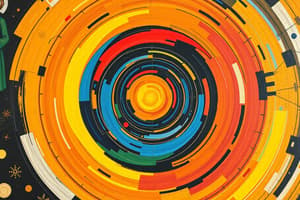Podcast
Questions and Answers
What did Galileo Galilei observe through his telescope?
What did Galileo Galilei observe through his telescope?
- More stars than previously known, mountains on the moon, and moons orbiting Jupiter (correct)
- The Copernican system where the Earth orbits the Sun
- The Ptolemaic model of the Earth at the center of the universe
- The weight of the planets and their organized motion
What did Galileo Galilei argue for?
What did Galileo Galilei argue for?
- The Aristotelian model of the universe organized by the weight of planets
- The Ptolemaic model of the Earth at the center of the universe
- The Copernican system and a universe governed by mathematical laws (correct)
- The theories of Johannes Kepler and his laws of planetary motion
What did Isaac Newton discover?
What did Isaac Newton discover?
- The laws of gravitation that explain the orderly motion of planets (correct)
- The concept of inertia and how it applies to objects at rest and in motion
- The Ptolemaic model of the universe
- The telescope and its use in observing the heavens
How did Newton build on Galileo's work?
How did Newton build on Galileo's work?
What was the main issue that the theories of Galileo, Kepler, and Copernicus sought to address?
What was the main issue that the theories of Galileo, Kepler, and Copernicus sought to address?
Which of the following statements accurately describes Nicolaus Copernicus's contribution to the Scientific Revolution?
Which of the following statements accurately describes Nicolaus Copernicus's contribution to the Scientific Revolution?
Which of the following statements is true about Tycho Brahe's contributions to astronomy?
Which of the following statements is true about Tycho Brahe's contributions to astronomy?
Which astronomer used the data collected by Copernicus and Tycho Brahe to determine that the Sun was the center of the universe?
Which astronomer used the data collected by Copernicus and Tycho Brahe to determine that the Sun was the center of the universe?
Which of the following statements best describes the impact of the Scientific Revolution?
Which of the following statements best describes the impact of the Scientific Revolution?
What significant discovery did Johannes Kepler make regarding the orbits of planets?
What significant discovery did Johannes Kepler make regarding the orbits of planets?
Flashcards are hidden until you start studying
Study Notes
The Scientific Revolution
- The Scientific Revolution was a significant change in the scientific view of the universe that occurred in the 16th and 17th centuries
- It established new scientific concepts and methods as the standard for assessing the validity of knowledge in the West
Nicolaus Copernicus
- Proposed heliocentrism, positioning the Sun at the center of the universe with Earth and other planets orbiting around it
- Challenged the prevailing geocentric belief that Earth was the center of the universe
- His theory eventually gained acceptance, leading to significant advancements in astronomy and scientific questioning
Tycho Brahe
- Made observations that were ultimately incorrect, but his efforts allowed for the collection of astronomical data used by later scientists
Johannes Kepler
- Used data from Copernicus and Tycho Brahe to determine that the Sun is the center of the universe
- Discovered that the orbits of planets are elliptical, not circular
Galileo Galilei
- Used a telescope to observe the heavens, discovering new stars, mountains on the moon, and moons orbiting Jupiter
- Argued for a universe of mathematical laws, suggesting that nature displays mathematical regularity in its most minute details
- Popularized the Copernican system and advocated for the concept of a universe subjected to mathematical laws
- Named the moons of Jupiter after the Medici family
Isaac Newton
- Investigated and established the laws of gravitation
- Published "The Mathematical Principles of Natural Philosophy", containing research and evidence from 15 years prior
- Took Galileo's concept of inertia and applied it to people at rest and in motion
- Figured out that planets and objects move due to the attraction of gravity, explaining why planets move in an orderly fashion rather than in chaos
Studying That Suits You
Use AI to generate personalized quizzes and flashcards to suit your learning preferences.




